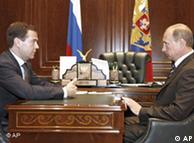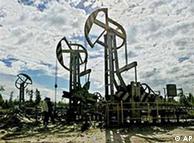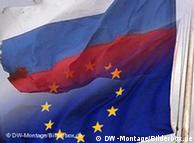European Ties | 26.06.2008
Hopes For New Pact Riding on Russian-EU Summit
Russia and the EU could finalize a new partnership accord within a year if negotiations go smoothly at this week's summit meeting, say observers.
The summit in the Siberian city of Khanty Mansiysk on June 26-27 will see Russia and the European Union relaunch talks on a wide-ranging political pact, jumpstarting relations out of their 18-month paralysis on issues ranging from energy to trade regulations.
The two-day meeting will be the first time the EU has held talks with Russian President Dmitry Medvedev since he took office last month, and hopes are high.
Russia seeks a "serious" pact with the European Union reaffirming it as part of Europe, Medvedev told Reuters.
"It must be a serious document but at the same time not burdened with absolutely concrete things," Medvedev said in an interview on Wednesday, June 25.
"If everything is okay on their side, if the positions aren't hampered by unnecessarily politicized issues, if they think about how a strategic partnership with Russia increases their own potential, then a goal can be set of one calendar year," an unnamed Kremlin official was quoted by Russian news agency RIA Novosti as saying.
 Bildunterschrift: Großansicht des Bildes mit der Bildunterschrift: Medvedev (left) is thought to be 'softer' than his predeccessor
Bildunterschrift: Großansicht des Bildes mit der Bildunterschrift: Medvedev (left) is thought to be 'softer' than his predeccessor
The EU side is to be represented by Commission chief Jose Manuel Barroso, Slovenian Prime Minister Janez Jansa as EU president and the bloc's foreign policy chief Javier Solana.
Some obstacles to new talks on a partnership agreement have already been lodged by the EU's new, post-Soviet member states, slow to reconcile their political differences with Moscow.
Kick-starting negotiations
But the bloc's 27 member states already agreed on a mandate to replace an expired partnership agreement last month, overcoming objections from Poland and Lithuania in time for the summit.
"One of the deliverables will be a political kick-start to negotiations on a future basic treaty," Russia's envoy to the EU Vladimir Chizhov said in Brussels on Monday.
Talks will cover a range of potentially prickly issues, but for both sides the summit will primarily be about testing the political will for compromise with no deadline in sight on reaching a new agreement.
A softer successor
The EU is keen on hearing whether Russia's new president will strike a softer line than his predecessor Vladimir Putin, who has been antagonistic over US missile defense plans, energy issues and Kosovo.
In his first major foreign policy speech in Berlin, Medvedev recently painted an optimistic vision of a new "Euro-Atlantic space from Vancouver to Vladivostok."
EU External Relations Commissioner Benita Ferrero-Waldner has also drawn hope from Medvedev's speeches in his "particular emphasis on the rule of law, human rights, democracy and also the modernization of the economy," she said in Moscow earlier this month.
Bones of contention
However, a number of bones of contention are on the agenda, such as the so-called frozen conflict in Georgia.
The European Union has pledged to take a take a tough line in telling Moscow to respect Georgia's territorial integrity.
The human rights issue could prove to be another stumbling block.
On Wednesday, Human Rights Watch accused Russian security forces of widespread human rights abuses in the southern province of Ingushetia near Chechnya.
The New York-based rights group said it has documented dozens of summary and arbitrary detentions, acts of torture, enforced disappearances and extrajudicial executions committed by security forces combating insurgents in Ingushetia.
 Bildunterschrift: Großansicht des Bildes mit der Bildunterschrift: Siberia is central to the Russian oil industry
Bildunterschrift: Großansicht des Bildes mit der Bildunterschrift: Siberia is central to the Russian oil industry
"The crimes in Ingushetia, although on a far smaller scale, evoke the thousands of enforced disappearances, killings and torture cases that plagued Chechnya for more than a decade," said Rachel Denber, deputy director of the group's Europe and Central Asia division.
Meanwhile, Vladimir Chizhov has made it clear that Russia would be no less adamant in its opposition to EU support for Kosovo's independence and US plans to site elements of a missile defense base in Poland and the Czech Republic.
"We have a question to ask: How does it come about that two EU member states are conducting negotiations with a third country (the United States) on missile defense behind the backs of their EU partners," Russia's ambassador to the EU said.
Symbolic location
Inviting EU delegates to Khanty-Mansiisk, a town of barely 60,000 in Siberia central to Russia's oil industry, was seen as a symbolic choice as energy questions dominate the summit's agenda.
EU officials said they were open to Moscow's interest in downstream investment in exchange for greater access to its vast energy sector, which experts say is badly in need of foreign capital and know-how.
Despite praising the "legal necessity" of achieving a new agreement with the EU, Russian officials this week were unwilling to cite a timeline.
Commenting on the foreign ministry's statements Tuesday, one radio announcer for Ekho Moskvye summed it up: "Russia gave the EU to understand it wouldn't be upset if negotiations hit a dead-end."

Comments